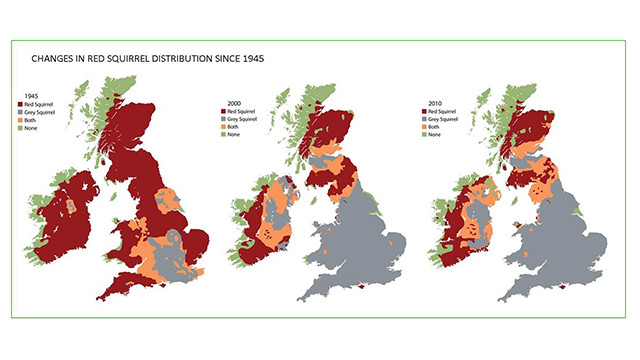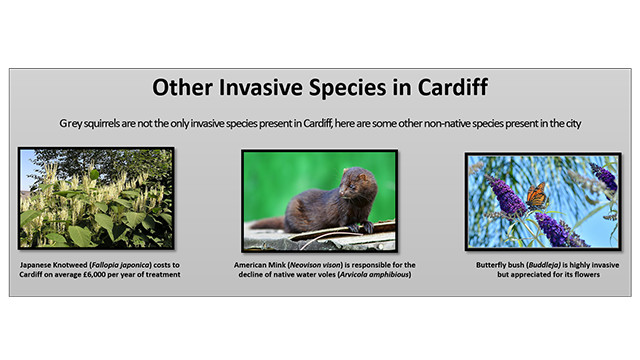Cardiff’s most charismatic mammal is one of the UK’s most hated, we meet the conservationists trying to protect its smaller red cousin in Wales. Is it time for us to give up on reds and learn to love their city cousins?

New to Cardiff, you may have noticed them quite quickly. You perhaps met them in a park or on your way to university. Grey squirrels are pretty common and loved in Cardiff and you can’t deny their cuteness and fluffiness. What you possibly don’t know however, is that they are one of the most hated species across the UK.
Greys squirrels are not from the UK but from the United States and Canada. They were introduced in Great Britain during the 19th century and have quickly and almost completely replaced the native red squirrels by transmitting them a deadly pox. Becky Hulme, Mid Wales Red Squirrel officer, says: “Grey squirrels are the main factor in causing the red squirrel population to decline. Wherever you get a grey squirrel population expanding, it usually takes about 15 years for the red population to disappear.”

But greys squirrels are doing more than causing their red cousins to disappear, they also cost the UK economy £14m per year of damages notably by bark stripping trees. Dr Craig Shuttleworth, adviser to the Red Squirrel Survival Trust, says: “In the UK and in Europe this animal is very, very destructive. And even in respect on how cute an animal may look we can’t get away from the fact that this particular animal, economically, is a disaster for the timber industry in Britain.”
To counter the effects of grey squirrels, eradication projects have been launched across North and Mid Wales. Recently, the island of Anglesey was declared a grey squirrel-free zone after an 18-year culling program. However, some like the RSPCA Cymru are raising concerns in term of animal welfare saying that “eradicating long-established entire populations of greys would be very difficult and cause suffering.” The ethic of killing one species to the benefit of another is quite debated among conservationists. Becky Hulme, however, says: “basically if we don’t do anything about the grey squirrels in the red squirrels areas, we are fully aware that it will mean the extinction of the red squirrels. So in a way doing nothing is an unethical choice as well.”

Eradicating the grey squirrel is a decision that was made by society as a whole and the debate has been recently quite heated with environmentalist George Monbiot skinning and eating a grey squirrel on TV. Craig Shuttleworth says: “you will find between 60 to 65% of the public in the UK as a whole, even in areas where there are no red squirrels, which say that the grey squirrel should be controlled to conserve the native red squirrel.”
This control could be done, however, in a more natural way for example by encouraging the reintroduction of predators such as the pine martin as it was done in Ireland. It could then reduce the population of grey squirrels more naturally without impacting the red ones. Matthew Harris says: “because the pine martin and the red squirrel have evolved together to establish a natural balance, they can live together.”
So in North and Mid Wales, grey squirrels are considered as a very destructive pest that needs to be controlled. But it is necessary to remember that those areas still contain red squirrel populations and economic forestry. It turns out that greys are not that destructive around Cardiff. Matthew Harris, ecologist for Cardiff County Council, says: “I don’t think we get many complaints about grey squirrels, if we did have complaints it would be, maybe sometimes they get into people’s roofs and they make a noise or they chew the wiring.”
In addition to this lack of damages, grey squirrels appear to be very popular in Cardiff so their removal wouldn’t be well-received by the local inhabitants. “About 20 years ago we did a wildlife survey of the public asking them what was their favourite animals or favourite piece of wildlife and grey squirrel was right at the top there,” says Matthew Harris.
So while the campaign against grey squirrels is still raging, it might be time to ask ourselves if we are fighting the right battle. Nothing in nature is ever black or white and the same applies to invasive species. Fred Pearce, environmental writer, says about grey squirrels “they are a much-loved feature of our urban landscapes in particular. Interestingly they prosper in native woodlands, unlike red squirrels, which prefer plantations of ‘alien’ tree species.” It seems that the alien debate is never as easy as we would like it to be.

